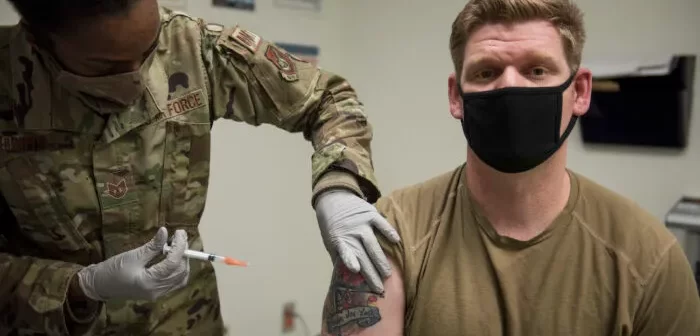The effectiveness of COVID-19 vaccines fell below 20 percent a few months after vaccination, with booster shots seeing effectiveness drop below 30 percent.
The review, published in the JAMA Network journal on May 3, analyzed 40 studies estimating vaccine effectiveness (VE) over time against laboratory-confirmed COVID-19 infection and symptomatic disease. The studies were selected from 799 original articles, 149 reviews published in peer-reviewed journals, and 35 preprints. The review found that the vaccine effectiveness of a primary vaccination cycle against the Omicron infection and symptomatic disease was lower than 20 percent at 6 months from the administration of the last dose.
Booster doses restored vaccine effectiveness to levels similar to those seen after administration of the primacy cycle dose. However, nine months after the booster dose, vaccine effectiveness against Omicron was found to be lower than 30 percent against infection and symptomatic disease.
“The half-life of VE against symptomatic infection was estimated to be 87 days for Omicron compared with 316 days for Delta. Similar waning rates of VE were found for different age segments of the population.”
“These findings suggest that the effectiveness of COVID-19 vaccines against laboratory-confirmed Omicron or Delta infection and symptomatic disease rapidly wanes over time after the primary vaccination cycle and booster dose,” the study said.
“Putting together the bulk of available evidence on the waning of VE over time against COVID-19 variants has crucial implications for future interventions and vaccination programs.”
Effectiveness by Vaccine Brand
Vaccine effectiveness against Omicron infection was 44.4 percent a month after the completion of the primary vaccination cycle. This fell to 20.7 percent at six months and then to 13.4 percent at nine months. Vaccine effectiveness was found to be higher against the Delta variant as compared to the Omicron variant.
“Pooled estimates of VE after any primary vaccination cycle against symptomatic disease after Omicron infection show a marked waning over time,” the study stated.
Effectiveness against symptomatic disease fell from 52.8 percent a month after completion of the primary vaccination cycle to 14.3 percent at six months and 8.9 percent at nine months.
“Our estimates suggest that the initial VE could be different depending on the vaccine product, with higher VE found at one month from the second dose administration for Moderna and Pfizer-BioNTech compared with AstraZeneca and Sinovac.”
With regard to age, vaccine effectiveness was found to be similar in younger and older age groups against the Omicron variant infection.
No “significant differences” were observed between the two age groups regarding vaccine effectiveness against Delta variant infection. “A significantly lower VE was found for both age groups for Omicron compared with Delta,” it stated.
The Epoch Times has reached out to Pfizer for comment.
Vaccine Harms
Earlier research from the same team had found that the length of the menstrual cycle increased by 3.7 days on average among women who had taken two doses of COVID-19 vaccines compared to those who hadn’t taken a shot.
According to a study from February published in the British Medical Journal, heart failure and deaths have occurred among those who have taken COVID-19 shots.
Researchers found that more people experienced myocarditis after COVID-19 vaccination than after being infected by the virus. Myocarditis is a type of heart inflammation.
A March report from Phinance Technologies, a global macro investment firm co-founded by former BlackRock portfolio manager Edward Dowd, estimates that COVID-19 vaccine damages in the United States resulted in more than 26 million people being injured last year, with such injuries costing almost $150 billion to the economy.
Misleading Effectiveness Claims, Compensation for Injuries
Texas Attorney General Ken Paxton is also looking at whether Pfizer, Moderna, and Johnson & Johnson misrepresented the efficacy of their COVID-19 vaccines.
According to Paxton, the companies may have violated the Texas Deceptive Trade Practices Act, which bars people intending to sell a product from disseminating a statement that they know “materially misrepresents the cost or character of tangible personal property, a security, service, or anything he may offer.”
It also bans representing that a product is “of a particular standard, quality, or grade … if they are of another.”
Paxton has asked the three companies to submit relevant documents and information, including any concerns with regard to the vaccine trials.
Meanwhile, letters from U.S. officials that were reviewed by The Epoch Times show that authorities rejected multiple individuals who had sought compensation for injuries suffered as a result of taking a COVID-19 shot despite diagnoses from doctors.
One such individual is agricultural pilot Cody Flint who began suffering from adverse reactions to Pfizer’s COVID-19 vaccine after taking a shot. Four doctors confirmed that his medical complication, including experiencing intense head pressure, were linked to the COVID-19 vaccine.
Flint sent the medical files to the U.S. Countermeasures Injury Compensation Program (CICP), which is tasked with compensating people who prove that they were injured due to getting vaccinated against COVID-19.
However, CICP rejected Flint’s claim, saying that it did not find the “requisite evidence” necessary to prove that his health issues were caused by the Pfizer vaccine.

